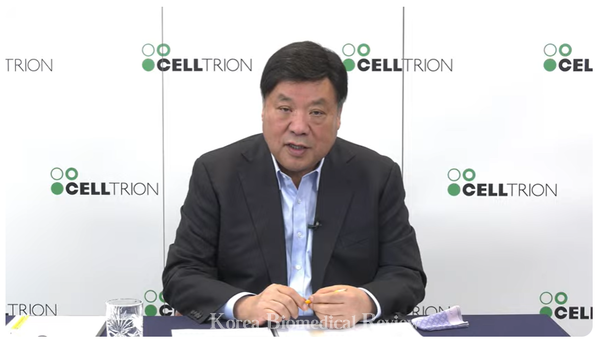Celltrion has unveiled a three-year plan to invest 4 trillion won ($2.7 billion) in its biomanufacturing and research infrastructure in Korea, positioning Korea as the company’s central production base even as U.S. investment requirements rise under the recently concluded tariff negotiations between Seoul and Washington.

The commitment was announced on Sunday by Celltrion Group Chairman Seo Jung-jin during a follow-up public-private meeting on the tariff agreement held at the presidential office in Yongsan.
Seo said the company will channel the investment into its hubs in Incheon’s Songdo district, Ochang in North Chungcheong Province, and Yesan in South Chungcheong Province -- an expansion he described as both a capacity upgrade and a model for balanced regional development.
Seo noted that securing high-skilled biopharmaceutical personnel remains a key challenge as talent often avoids relocating outside major metropolitan areas.
He called on central and local governments to work together on incentives and residential support to make the regional sites sustainable, saying the initiative could become a symbolic turning point for reversing concerns about weakening domestic investment.
The announcement comes as Celltrion accelerates its overseas footprint. In September, the company acquired Eli Lilly’s manufacturing plant in New Jersey, completing a local production base in the U.S.
Seo acknowledged that expanding manufacturing in the U.S. would require roughly 2 trillion won but pledged to double that amount in Korea, reinforcing that the company intends to keep its core capabilities at home while meeting U.S. policy expectations.
The company will also scale up research and development spending. Seo said Celltrion has been investing about 600 billion won annually in R&D but will raise that to 800 billion won next year, with the figure surpassing 1 trillion won in 2027.
“Such an increase would place the company on par with global top-tier pharmaceutical firms,” the chairman said.
Celltrion also plans to expand its startup collaboration fund from the current 500 billion won to 1 trillion won, contingent on government policy support. “The enlarged fund could help establish a structured ecosystem for Korea’s biotech startups,” Seo said.
He further urged regulatory improvements to reduce the clinical trial cost burden on Korean drug developers, emphasizing that the goal is not deregulation but alignment with global standards.
“With the U.S. and Europe advancing toward mutual sharing of clinical data, Korea’s participation in such frameworks could significantly shorten trial timelines and reduce expenditure,” he said.
The chairman also highlighted opportunities in healthcare artificial intelligence, noting that a portion of Celltrion’s outbound investment cap of $20 billion could be directed to AI-enabled self-diagnosis platforms and global telehealth services.
Related articles
- Celltrion signs up to $744 mil. deal with Maryland's Kaigene for 2 autoimmune drugs
- Celltrion partners with MustBio to co-develop next-generation triple fusion immunotherapy
- Celltrion’s Avastin biosimilar takes Japan’s top spot with 50% share
- Celltrion to expand global partnerships at CPHI Worldwide 2025 in Frankfurt
- Celltrion scores EU line extension OK for Omlyclo in 300 mg pre-filled syringe
- Once a biosimilar pure play, Celltrion reloads with Lilly plant and obesity pill in push to rival Samsung Biologics
- TriOar inks $356 million platform tech transfer and joint development deal with Celltrion

